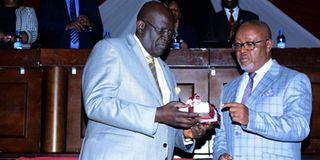KUCCPS opposes plan to withdraw State-sponsored students from private varsities

Education Cabinet Secretary George Magoha (left) receives the 2019/20 colleges and universities students' placement results from Kenya Universities and Colleges Central Placement Service CEO John Muraguri, last year.
What you need to know:
- Ms Wahome says students should be allowed to join private institutions of their choice according to the existing law.
- Equally, sponsors of private universities plan to petition Parliament against the move to withdraw students saying it will undo the strides the country has made in higher education.
The Kenya Universities and Colleges Central Placement Service (KUCCPS) has opposed the proposal to withdraw government-sponsored students from private universities.
The KUCCPS acting chief executive Ms Agnes Mercy Wahome wants the current position maintained, in contrast to what vice chancellors of public universities had proposed.
Ms Wahome says students should be allowed to join private institutions of their choice according to the existing law.
“As a placement service, we request both public and private universities to declare their capacity and to put their degree programmes online for students to choose,” she said.
Equally, sponsors of private universities plan to petition Parliament against the move to withdraw students saying it will undo the strides the country has made in higher education.
Public universities
The VCs of public universities had told Parliament’s Education Committee chaired by Busia Woman Representative Florence Mutua early last week that they had enough capacity to absorb all students who qualify and, as such, there was no need to send students to private universities.
The chairman of the National Association of Private Universities in Kenya, Simon Gicharu, says the trustees are mandated by the section 53 and 55 of the University Act, 2012, to provide conditional grants and loans and also ensure that the University Funds Board provides money to support students placed by KUCCPS as government-sponsored students.
“The operationalisation of section 53 and 55 of the Universities Act no 42 of 2012 by the Ministry of Education is a lawful process. There have been varied stories in the media in the recent past misleading the public to the effect that the placement of government-sponsored students in private universities is an afterthought or favour,” Mr Gicharu said.
“The students are at liberty to select a university of their choice as provided for by law.”
He termed as draconian the move by the leadership of state institutions of higher learning.
“We will defend the gain. We cannot allow these individuals to take it away. They may want to familiarise themselves with the fact that when applying for the National Research Fund, we do so as universities and not as public or private,” Mr Gicharu said
“Any person violating that will be violating the law and the law will take its course”.
In a move to increase the student intake in higher learning institutions, President Uhuru Kenyatta, in August 2016, directed that 10,000 state-funded students be admitted to private universities.
Mr Gicharu, who is the founder of the Mount Kenya University, sought to set the record straight by insisting that by paying school fees for the students, it did not mean that the government was now funding private institutions.
Exam fees
He added that the government paying for the Kenya Certificate of Primary Education (KCPE) exam fees for students in both private and public schools did not mean that the government funded the institutions.
The change could spell doom to 34 private universities already benefiting from the programme. They receive a varying number of students depending on their capacity as per the audit conducted by government with the MKU receiving a lion's share of learners.
Private universities, accused by their public counterparts of receiving colossal of amounts money from the government, insist that the money they get from the state only funds the government-sponsored students in their institutes and not the universities.
A total of 88,929 students attained the C+ grade and above to earn their space in universities in the year 2016/17. Whereas the public universities absorbed 69,127 of this lot, their private counterparts took in 6,312, accounting for 7 percent of the total student’s admissions.
The figures for the private universities admissions of the government sponsored students shot up to almost double in the year 2017/18 to 12,275 representing 17.5 percent of the total 70,073.
This number however reduced to 11,239 (16.4 percent) of the total 68,156 admitted in the year 2018/19 and still slipped downwards to 10,276 (11.3 percent) out of the total 90,377 admitted in the year 2019/20. Currently, the total number of government-sponsored students in private universities stands at 61,237.
Sh1.98billion
Data from the private universities recently presented before the National Assembly shows that the government did not grant them any amount for the first lot they admitted in 2016. However, the government gave them Sh2billion in 2017 to carter for the lot that joined in 2016 together with the other lot that joined in 2017.
In 2018, Sh1.98billion was allocated to the private universities and Sh2.4 billion in 2019. The data also shows that in the current academic year, 2020/21, a total of 125,746 students attained the minimum university entry grade of C+ with the private wing admitting 27,447 (21.8 percent) of the total figure. For this academic year, they were allocated Sh2.5 billion by the State to fund the government-sponsored students.
Mr Gicharu referred to the National Health Insurance Fund (NHIF), which despite being a public entity, was supporting patients in both private and public hospitals.
“I have never heard chief executives of public hospitals advocating for NHIF to support patients joining public hospitals alone. This is the same case for Higher Education Loans Board (HELB) which supports students in both public and private universities,” he told the Sunday Nation.
Mr Gicharu he said the government was paying Sh38, 000 per year to support students studying medicine in private universities and “any pragmatic policy maker would support this initiative and ask private universities to pay more.”





